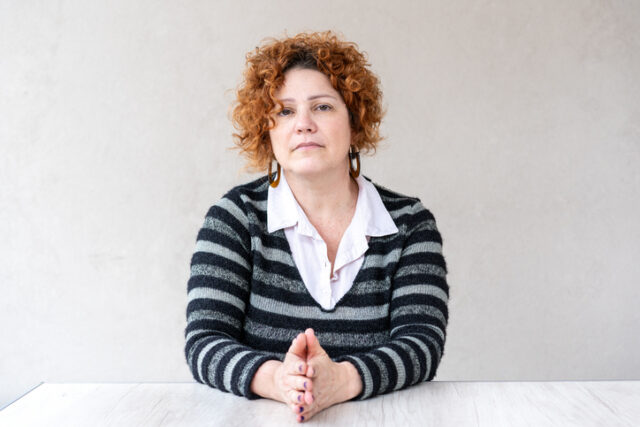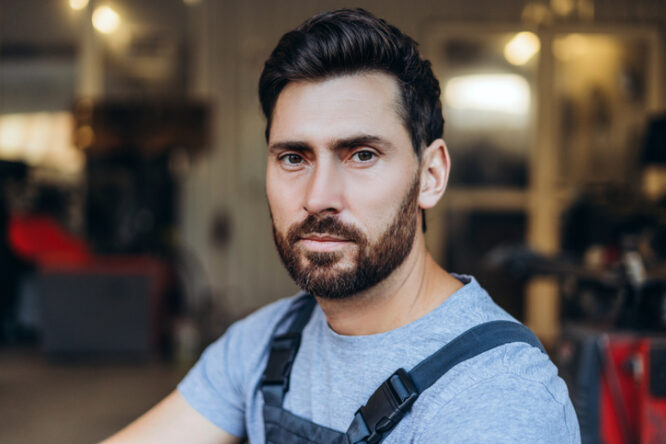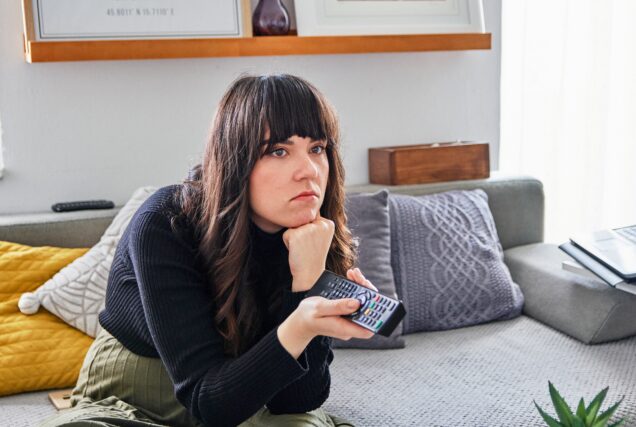When you’ve spent a long time pretending everything’s fine, something eventually changes.

You start to notice little differences in how you talk, how you show up, and how you protect your own energy. It’s not always dramatic or obvious, but the impact of faking being okay for too long always finds a way to surface. These are the subtle, everyday things that often start to show up. If you notice them happening to you, don’t just ignore it—you don’t have to live that way. If you’re struggling, talk to a friend or someone that you trust, or contact Samaritans at 116 123.
1. You catch yourself crying over things that shouldn’t feel that deep.

One moment you’re watching a random video or hearing a familiar song, and suddenly, there are tears—real ones, the kind you didn’t expect. It’s not because the moment was overwhelming on its own. It’s because you’ve been holding things in for so long, even your nervous system doesn’t know where to place the buildup anymore.
Your body’s just looking for an outlet, and when there’s no “right time” to fall apart, your feelings find whatever door is open, even if it’s a supermarket advert or a story about a stranger’s dog.
2. You feel a quiet resentment toward people who lean on you too much.

You used to be everyone’s go-to—the helper, the fixer, the calm one. The problem is that when you’ve been carrying your own stress silently for years, it becomes hard to keep giving that same level of support. The people who once leaned on you without hesitation now make you feel tired in ways you can’t explain. It’s not that you don’t care, it’s that your capacity has changed. For the first time, you start noticing how much of your energy has gone toward everyone but you.
3. You become unusually attached to small rituals and comforts.

The right mug, the exact way you light a candle, the playlist you’ve played to death—they start to matter more than they used to. Those little comforts become your anchor. When so much of your emotional world has been packed away, small consistencies start to feel like safety. They’re not down to aesthetic or habit. They’re your way of creating small, steady moments of ease when everything else has felt like effort.
4. You zone out in conversations—not out of boredom, but exhaustion.

You find yourself drifting during chats, even with people you genuinely enjoy. Your eyes might be on them, but your mind is somewhere else, just trying to recover. When you’ve spent years pretending you’re okay, even light interaction can feel like another emotional demand. It’s not intentional rudeness; it’s emotional depletion. Your brain is conserving what little energy it has left, and sometimes that means checking out just to keep functioning.
5. You stop replying instantly, and you don’t apologise for it anymore.

Where you once answered messages right away, now you pause. Sometimes for hours, sometimes for days. It’s not out of avoidance, but because your bandwidth is different now, and you’ve stopped forcing yourself to be constantly available. There’s relief in not rushing to respond. For once, you’re giving yourself time before pouring energy into other people. Even if no one else understands it, that slow-down feels like reclaiming a little bit of peace.
6. You flinch at dismissive comments that you used to brush off.

Phrases like “You’ll be fine” or “It’s not that bad” hit differently now. You’ve said those things to yourself so many times to survive that hearing them from someone else feels like an echo of the minimisation you’ve been unlearning. You’re not more sensitive; you’re more aware. The more you notice how often people bypass emotion, the less willing you are to join them in pretending nothing hurts.
7. You find yourself keeping things light, even when you want to go deep.

You crave connection, but vulnerability feels awkward. You crack jokes, deflect, or talk around the things you really want to say. After years of masking pain, it’s not easy to suddenly open up, even to people you trust. You’re not being dishonest; you’re protecting something tender. And until it feels safe to go there, you keep conversations easy, even when you secretly want more.
8. You quietly love it when plans fall through.

It doesn’t matter how excited you were to begin with—if something gets cancelled, there’s a wave of relief that washes over you. Not because you didn’t want to go, but because now you don’t have to show up, make small talk, or put on your socially present version of yourself. The break feels like a gift. No pressure to be “on.” Just time to be quiet without anyone asking you to explain it.
9. You rewatch the same shows instead of trying new ones.

Comfort becomes a bigger priority than stimulation. New shows feel unpredictable, and you’re not in the mood to be emotionally surprised. Familiar scenes feel safe. You already know the storyline, and nothing about it demands anything extra from you. It’s not laziness; it’s nervous system maintenance. You’re giving yourself a break from all the unknowns that come with new things because, frankly, life already feels full.
10. You catch yourself apologising out of habit, even when nothing’s wrong.

You say “sorry” when you bump into a chair, when you need to ask for clarification, or when someone else makes a mistake. The reflex is so strong, you barely register it. Then the frustration hits—why are you always the one apologising for existing? It’s what happens when you’ve made yourself small to stay likeable. Only now, you’re starting to catch it—and with time, you’re learning not to shrink.
11. You overanalyse tone in texts and emails, even when things are fine.

A slightly shorter message or a missing emoji can send you into a major spiral. You replay the conversation in your head, double-check what you sent, and brace yourself for a problem that probably isn’t there. This isn’t paranoia. It’s pattern recognition from years of emotional unpredictability. You’re still learning to trust peace, and part of that process includes unlearning hypervigilance.
12. You journal or voice-note just to get the noise out of your head.

You’re not documenting your life or trying to sound profound—you’re just trying to hear yourself clearly. When you’ve spent years pretending you’re fine, journaling can be a private space to be honest, messy, and uncensored. It becomes your emotional off-switch. A place where you don’t have to package things neatly for anyone else. Just you, saying things you weren’t sure you were allowed to feel.
13. You stop giving your energy to people who always leave you drained.

Where you once forced politeness or showed up out of guilt, now you pull back. You start choosing your peace over obligation. If someone consistently leaves you feeling worse, you slowly create distance, even if you never say it out loud. It’s not spite. It’s self-preservation. You’re finally realising that your energy is valuable, and not everyone deserves to keep borrowing it just because they’ve always had access.
14. You stop overexplaining your boundaries, and just hold them.

Instead of trying to make everyone understand, you start saying no without the speech. You don’t justify your limits, and you don’t ask for permission to rest. After years of pretending, you’re just too tired to keep asking for emotional permission. It feels different—subtler, but stronger. You’re no longer performing ease, or stretching past your comfort. You’re simply protecting what’s left of your energy, and that’s a strength in itself.




